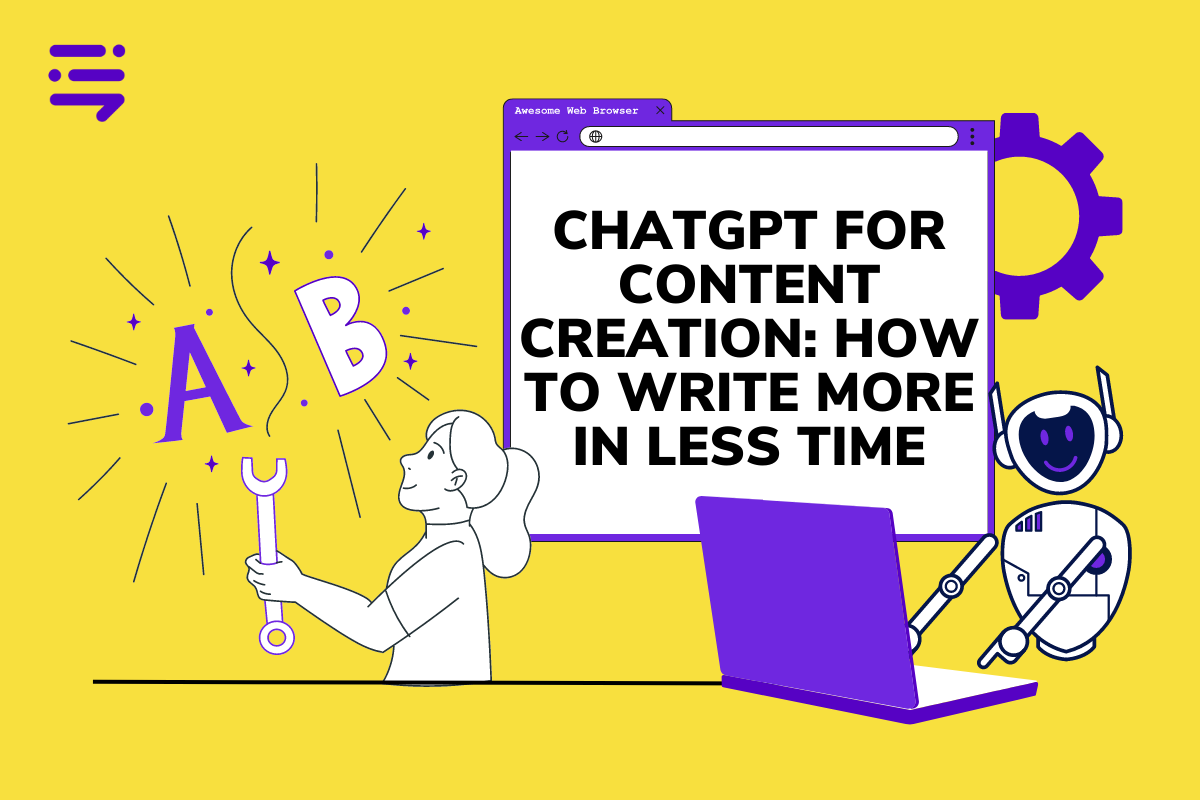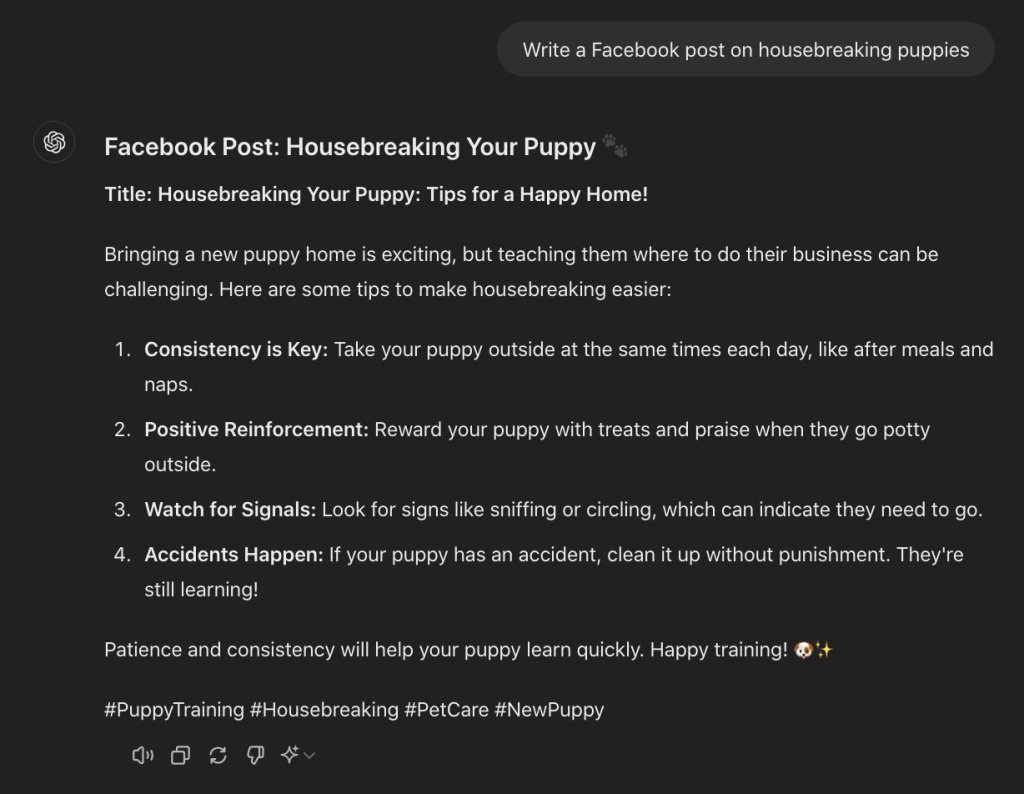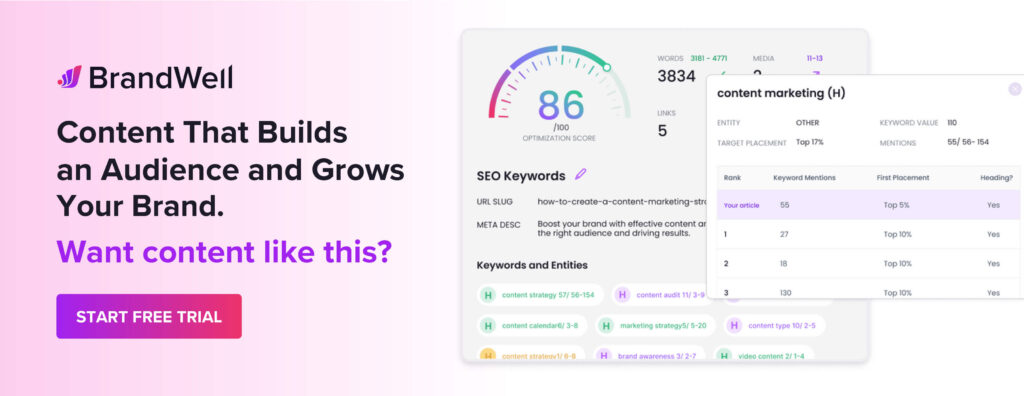Discover top guides, trends, tips and expertise from AIO Writers
ChatGPT for Content Creation: How to Write More in Less Time
Julia McCoy
Thursday, 27th Apr 2023
Content creation can be time-consuming. For many marketers, it takes more than 4 hours to write a single blog post. That’s already half of your work shift!
Thankfully, the bots are here. Super smart tools like BrandWell and ChatGPT can cut that 4-hour average to a mere 5 minutes! All the research and writing are left to the machine so you can focus on more important tasks like SEO and content promotion.
This blog post will focus on ChatGPT for content creation and how it has emerged as a game-changing tool. You will learn how ChatGPT helps create various types of high-quality content so that you can take advantage of the full potential of this amazing technology.
What is ChatGPT?
ChatGPT is an advanced language model developed by OpenAI that leverages the power of artificial intelligence (AI) to generate human-like responses to questions or prompts. ChatGPT has taken the Internet by storm since it came out in November 2022 with its ability to generate well-written content in a variety of fields and topics.
How does ChatGPT work?
ChatGPT uses natural language processing (NLP) algorithms to understand context and produce coherent responses. This AI-driven tool can be utilized for multiple purposes such as drafting emails, writing articles, creating social media posts, generating code snippets, answering questions, and much more.
ChatGPT offers two main benefits:
- Drastically cuts your writing time: With its quick response time and ability to generate large amounts of content in seconds, ChatGPT saves users valuable time compared to manual content creation.
- Boosts creativity: By providing unique ideas or perspectives on topics you might not have considered before, ChatGPT helps enhance your creativity.
Content Creation with ChatGPT
Creating engaging, high-quality content is essential for successful content marketing, and ChatGPT offers innovative solutions to help achieve this goal. It has become a game-changer in this regard by offering unique solutions to create various types of content.
Types of Content You Can Create with ChatGPT
The versatility of ChatGPT allows users to produce a wide range of content forms tailored to their specific needs. Some popular examples include:
- Social media captions.
- Email newsletters.
- Product descriptions.
- Blog outlines.
- Landing page copywriting.
By leveraging the power of ChatGPT, businesses can create compelling content that resonates with their audience and drives engagement.
Here’s an example of short-form content that ChatGPT created based on my prompt: Write a Facebook post on housebreaking puppies.
It took the AI less than 10 seconds to write this:


Quality of AI-Generated Content
As you can see from the example above, ChatGPT is capable of producing content that is coherent, informative, and engaging. While it’s important to note that AI-generated content still requires some human editing and proofreading, the overall quality is impressive.
The OpenAI team behind ChatGPT has made significant improvements in reducing common issues like repetitive phrasing or irrelevant information.
Search engines like Google prioritize high-quality content that provides value to users. With ChatGPT’s advanced language model, you can generate engaging content that caters to your target audience’s needs and preferences.
In addition, as Core Web Vitals become increasingly important for SEO performance, having readable and easily digestible content generated by AI tools ensures better on-page metrics such as time-on-site and bounce rate – factors considered by search algorithms when determining page rankings.
How to Turn AI Content Into a Powerful Marketing Tool
The first step in maximizing the benefits of AI in content creation is understanding how to harness its power effectively. To do so, you must:
Understand Your Audience
Before creating any content with ChatGPT, ensure that you have a clear understanding of your target audience’s needs and preferences. This will enable you to generate relevant topics that resonate with them.
Tailor Prompts Carefully
The key to getting the most out of ChatGPT is understanding that “garbage in, garbage out” applies here too. This means that if you provide unhelpful or non-specific information as your prompt, you’ll likely get an equally unhelpful and non-specific response back. It’s important to keep this in mind when using ChatGPT so that you can maximize its potential.
What makes a good prompt?
As with any new technology, there are still many unknowns when it comes to what makes a good prompt for ChatGPT. The best way to figure this out is by trial and error. Try different prompts and see which ones work best for your creative process and style.
Generally speaking though, the more specific the prompt is (i.e., including details about characters or settings), the better chance it has of yielding quality results from ChatGPT.
The quality of output generated by ChatGPT largely depends on the input provided. Make sure to craft precise and detailed prompts to guide the AI in generating the type of content you want.
Edit Output with Human Eyes
While AI-generated text looks good enough to publish outright, it still needs human expertise in refining outputs while maintaining an authentic voice throughout your piece.
Challenges and Limitations of ChatGPT
ChatGPT is an incredibly powerful tool but it has its limitations when it comes to creating content. The technology still struggles to write a full article and often writes less than a page worth of content even if you ask it to write a specific amount of words.
If you need long-form content, the better choice is a specialized tool like BrandWell. This all-in-one brand growth platform is designed specifically to write in-depth blog posts backed by deep research. All you have to do is enter a keyword and the AI will generate a 2,900-word article that is SEO-optimized for that key phrase.
Another limitation of ChatGPT is that it’s only been pre-trained up to January 2022 so it does not have access to any information on more recent events — making news reports or up-to-date articles difficult to generate. In contrast, BrandWell crawls the web in real time so you get updated info every time.
Another challenge with using ChatGPT is that AI-generated content will never be as good as human content creators regarding writing style and personalization. It often needs fine-tuning before getting the correct output which requires extra effort from a human. Again, this is where BrandWell stands head and shoulders above all the AI writers out there. You can train it in your writing style so that all your blog posts sound like you. In fact, the BrandWell output is so good you barely need to edit it.
These are just some of the more trivial issues with ChatGPT. The more pressing concern is ChatGPT’s tendency to give wrong answers, exhibit bias, and even plagiarize copyrighted work. Read our separate blog post for a more thorough list of ChatGPT limitations.
Real-World Applications for ChatGPT
As a content marketer, how can ChatGPT help you perform your job? Here are three ways ChatGPT can make your tasks easier.
Content Generation
ChatGPT is a powerful tool for content generation, especially when it comes to written content. You can use AI to create blog posts and social media posts quickly and easily.
For example, you can prompt the chatbot to write a post specifically for LinkedIn or adjust the language structure of an existing piece of content so that it sounds like it was spoken by someone famous, such as Morgan Freeman.
You can also generate dozens of different posts in just seconds and then schedule them out later. However, make sure your format is correct as ChatGPT often struggles with character limits on social media platforms.
Ideation
ChatGPT isn’t only useful for creating written content — it’s also great for generating ideas for blog posts and other types of web content. It won’t give you up-to-date details about search volume or website traffic, but it will help get your creative juices flowing so that you have something interesting to write about.
Google Search Alternative
Finally, ChatGPT can be used as a simpler version of Google search – perfect if you need quick answers without going through extensive research online.
For instance, if you’re trying to find the right word for a sentence or want more information on a specific term – simply type it into ChatGPT instead.
Strategies for Optimizing AI Content
One of the limitations of ChatGPT is that it does not know SEO. While the bot is good at researching and writing a baseline draft, you the content marketer are still in charge of optimizing that piece of content to ensure it reaches the right people.
For content to rank well on search engines and drive organic traffic, you need to optimize it using effective SEO strategies. Here are a few tips to help you make the most of your AI-generated content.
- Keyword Research: Identify relevant keywords for your niche and incorporate them naturally into your content. Tools like Ahrefs Keywords Explorer or Google Keyword Planner can be helpful in this process.
- Create Share-Worthy Articles: By generating engaging, informative pieces on trending topics or niche subjects within your industry, other websites may find value in linking back to your site as a reference source – thus increasing its domain authority.
- Metadata: Optimize title tags and meta descriptions by including targeted keywords while ensuring they accurately describe the page’s content.
- Internal Link Building: Create relevant internal links with descriptive anchor text. This helps search engines understand the context of your content so they can index it properly.
- Optimize Images: Use descriptive file names and alt tags for images, ensuring they are compressed to improve page load times.
- Write Compelling Guest Posts: Use AI to write captivating guest posts tailored specifically for authoritative blogs within your field – an excellent way of earning quality backlinks while showcasing expertise.
- Promote Linkable Assets: Generate unique resources such as infographics, whitepapers, or case studies with the help of AI. These assets can attract valuable backlinks from other websites looking to cite credible sources.
Watch the video below why ChatGPT could be dangerous for SEO:
Integrating Social Media into Your Strategy
Social media is essential for content marketing, as it allows you to reach more people and build relationships with them. Here are some tips to integrate social media platforms into your AI-driven content strategy.
- Create platform-specific content: Adapt the AI-generated text for different social media platforms by tailoring its format, tone, and length accordingly. For example, shorter snippets of information work well on Twitter while longer-form posts may be more suitable for LinkedIn. (Our example above was written for Facebook)
- Leverage hashtags: Utilize relevant hashtags when sharing your AI-generated content on social media. This will help increase visibility and attract potential customers who are interested in your niche.
- Monitor engagement metrics: Keep track of how users interact with your AI-generated content across various social channels using analytics tools such as Google Analytics. Use this data to refine future strategies based on user preferences and behaviors.
Incorporating these tips into your workflow can significantly enhance the benefits of ChatGPT content creation. By combining human expertise with artificial intelligence capabilities, you’ll create engaging, high-quality material that resonates with readers while also improving SEO performance.
Conclusion
Embracing the power of ChatGPT for content creation can lead to significant improvements in your digital marketing strategy. Utilizing AI-powered content can help you to maximize your online presence and gain better outcomes in terms of SEO ranking and user engagement.
The future is bright when it comes to creating content with AI. To stay ahead in today’s competitive digital landscape, embracing these advancements would be a wise decision for any business or marketer.

UNLOCK YOUR POTENTIAL
Long Headline that highlights Value Proposition of Lead Magnet
Grab a front row seat to our video masterclasses, interviews, case studies, tutorials, and guides.



